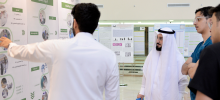Saudi Society for Medical Education Proposes New Set of Clinical Exam Procedures

The Saudi Society for Medical Education at King Khalid University recently held its fourth board meeting. A committee of medical education and evaluation experts was formed to study the issue of clinical examination in order to come up with recommendations and proposals. Some of these proposals were submitted to the Committee of Medicine Faculties' Deans in Saudi Universities.
Director of the Saudi Society for Medical Education, Head of the Surgery and Medical Sterilization Departments at the College of Medicine, Dr. Abdulaziz Al-Amri, explained that this was within the process of producing guidance documents to the clinical examination mechanism. Especially, after the rapid transformation to full e-learning because of the COVID-19 crisis.
Dr. Al-Amri confirmed that the submitted recommendations and proposals include replacing the midterm exams with specific tasks and assignments. The theoretical final exams, on the other hand, would include 60 multiple choice questions that are designed to evaluate higher thinking skills. As for the clinical examination, three methods have been proposed. The first method is an online oral exam where questions to evaluate the clinical skills are asked. It would be through videos to two students or more. This method would be suitable for students with advanced clinical knowledge. It is also preferable that the examiners are trained in this field. This method is a highly reliable tool to evaluate problem-solving, critical thinking, clinical thinking, data interpretation, and the diagnosis and treatment plan.
The second method proposed to the clinical examination is similar to the Objective Structured Clinical Examination (OSCE). A case or diagnosis data are presented and the student answers multiple choice and short essay questions related to it. This method evaluates cognitive clinical skills not practical skills. The third method was to postpone the clinical examination until this crisis is over. Then the students would be given intensive clinical training and the OSCE as usual.
Dr. Al-Amri added that it was also recommended to select a method that depends on the clinical training the student acquired before the shutdown. The skills of the faculty members writing the questions. It was noted that the first two options are not a substitute for clinical training and evaluation.









